外研版(2019)必修第二册Unit 4 Stage and Screen Starting out & Listening课件(共23张PPT,内镶嵌视频及音频)
文档属性
| 名称 | 外研版(2019)必修第二册Unit 4 Stage and Screen Starting out & Listening课件(共23张PPT,内镶嵌视频及音频) |
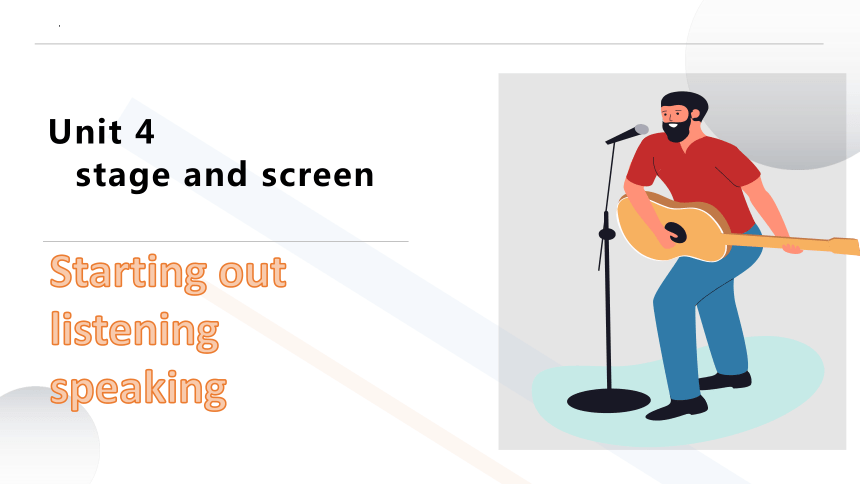
|
|
| 格式 | pptx | ||
| 文件大小 | 51.5MB | ||
| 资源类型 | 教案 | ||
| 版本资源 | 外研版(2019) | ||
| 科目 | 英语 | ||
| 更新时间 | 2024-04-18 00:00:00 | ||
图片预览

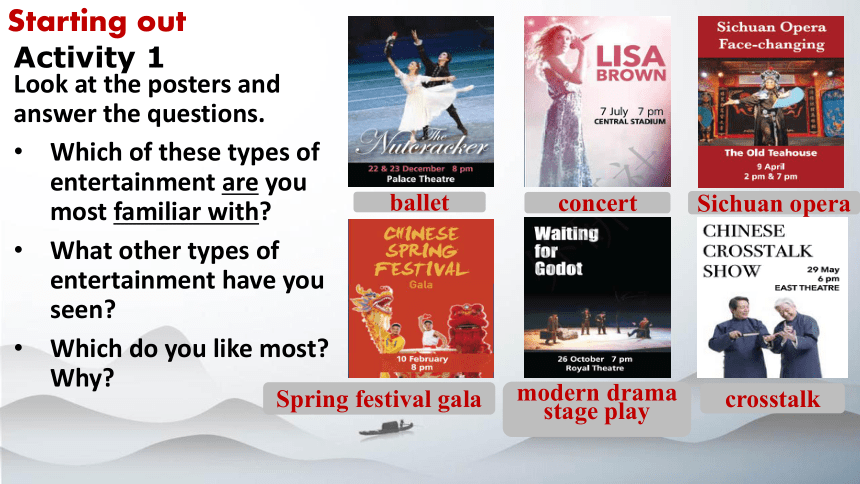
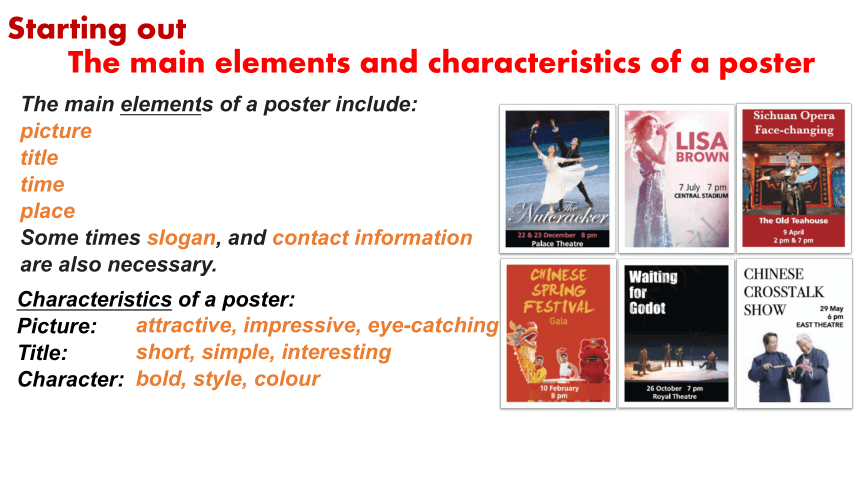
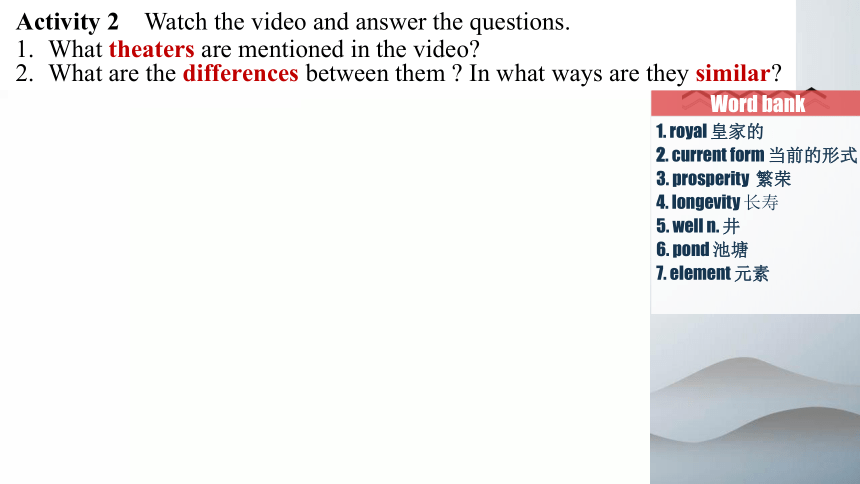
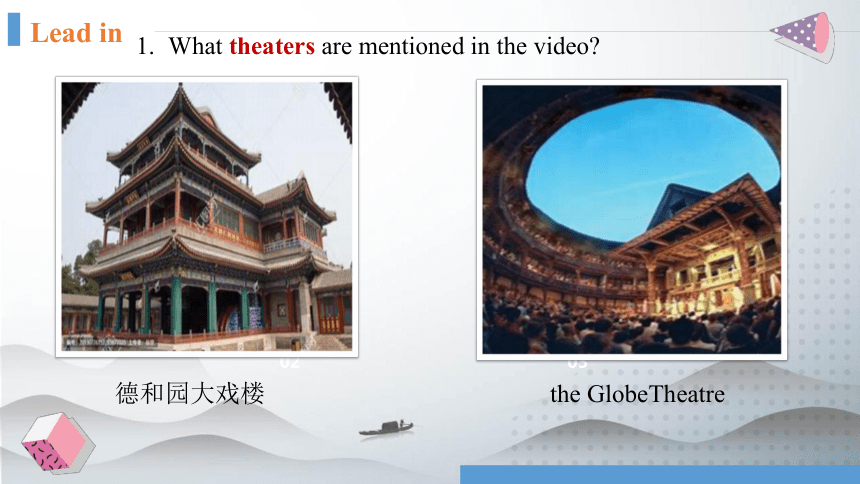
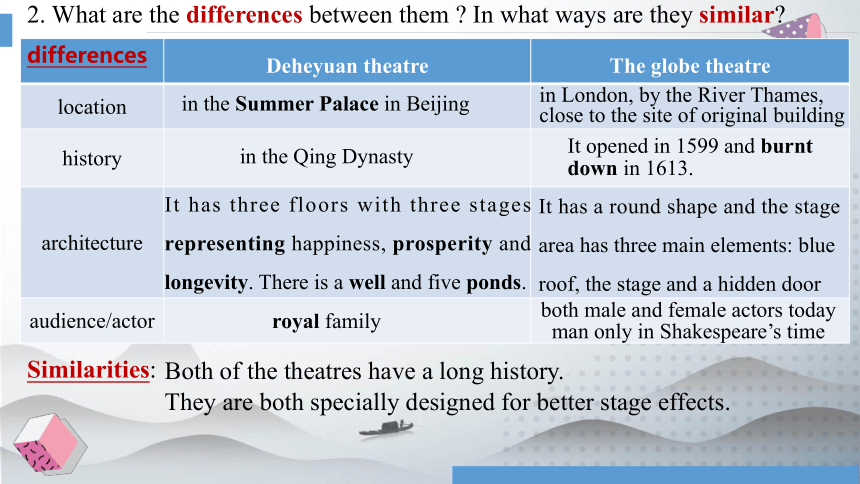
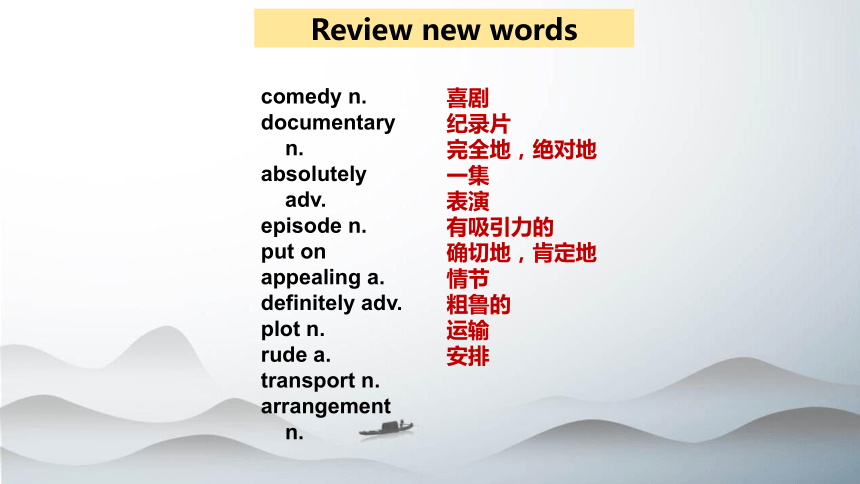
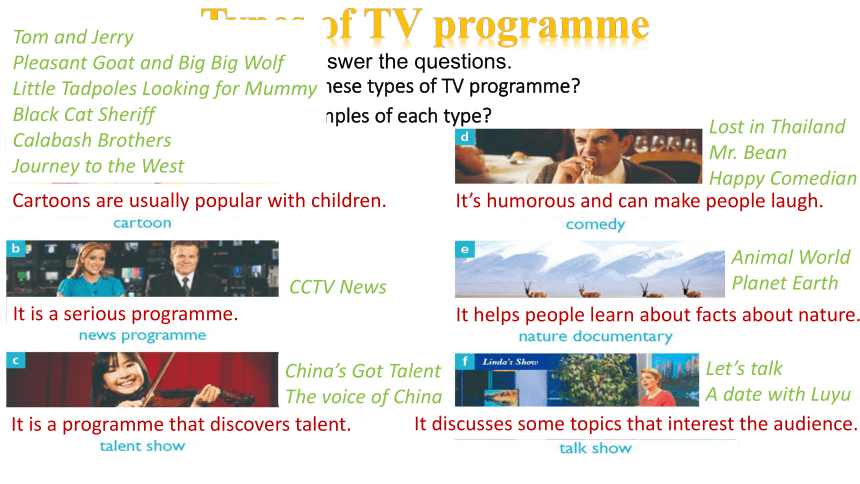
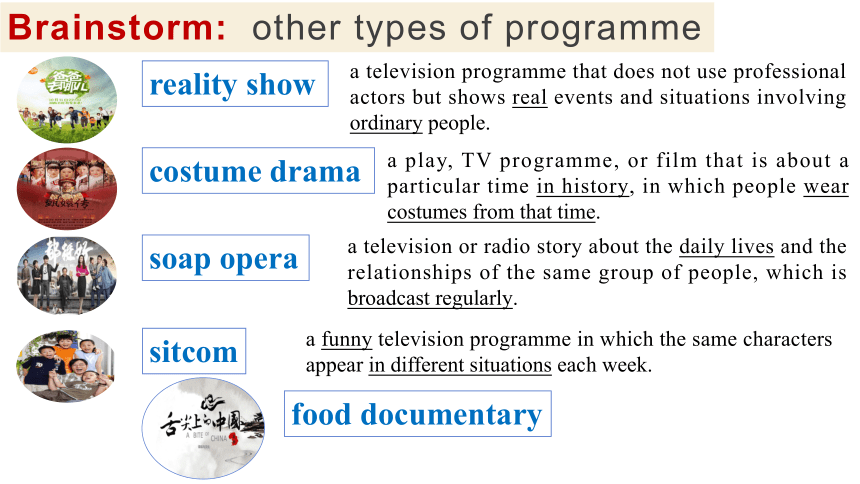
文档简介
(共23张PPT)
Unit 4
stage and screen
Starting out
listening
speaking
Unit
Look at the posters and answer the questions.
Which of these types of entertainment are you most familiar with
What other types of entertainment have you seen
Which do you like most Why
Activity 1
ballet
concert
Sichuan opera
Spring festival gala
modern drama
stage play
crosstalk
Starting out
The main elements and characteristics of a poster
The main elements of a poster include:
picture
title
time
place
Some times slogan, and contact information are also necessary.
Characteristics of a poster:
Picture:
Title:
Character:
Starting out
attractive, impressive, eye-catching
short, simple, interesting
bold, style, colour
Activity 2 Watch the video and answer the questions.
What theaters are mentioned in the video
What are the differences between them In what ways are they similar
Word bank
1. royal 皇家的
2. current form 当前的形式
3. prosperity 繁荣
4. longevity 长寿
5. well n. 井
6. pond 池塘
7. element 元素
01
02
02
03
Lead in
德和园大戏楼
the GlobeTheatre
What theaters are mentioned in the video
differences Deheyuan theatre The globe theatre
location
history
architecture
audience/actor
in the Summer Palace in Beijing
in London, by the River Thames, close to the site of original building
in the Qing Dynasty
It opened in 1599 and burnt
down in 1613.
It has three floors with three stages representing happiness, prosperity and longevity. There is a well and five ponds.
It has a round shape and the stage area has three main elements: blue roof, the stage and a hidden door
royal family
both male and female actors today
man only in Shakespeare’s time
Similarities:
2. What are the differences between them In what ways are they similar
Both of the theatres have a long history.
They are both specially designed for better stage effects.
01
Review new words
comedy n.
documentary n.
absolutely adv.
episode n.
put on
appealing a.
definitely adv.
plot n.
rude a.
transport n.
arrangement n.
喜剧
纪录片
完全地,绝对地
一集
表演
有吸引力的
确切地,肯定地
情节
粗鲁的
运输
安排
What do you know about these types of TV programme
Can you think of some examples of each type
Types of TV programme
4
Look at the pictures and answer the questions.
Cartoons are usually popular with children.
It is a serious programme.
It is a programme that discovers talent.
It’s humorous and can make people laugh.
It helps people learn about facts about nature.
It discusses some topics that interest the audience.
Tom and Jerry
Pleasant Goat and Big Big Wolf
Little Tadpoles Looking for Mummy
Black Cat Sheriff
Calabash Brothers
Journey to the West
CCTV News
China’s Got Talent
The voice of China
Lost in Thailand
Mr. Bean
Happy Comedian
Animal World
Planet Earth
Let’s talk
A date with Luyu
food documentary
Brainstorm: other types of programme
costume drama
soap opera
sitcom
reality show
a television programme that does not use professional actors but shows real events and situations involving ordinary people.
a play, TV programme, or film that is about a particular time in history, in which people wear costumes from that time.
a television or radio story about the daily lives and the relationships of the same group of people, which is broadcast regularly.
a funny television programme in which the same characters appear in different situations each week.
delete it from my favorites list.
Read and match the descriptions to the types of TV programme in Activity 4.
Underline and categorize the words and expressions describing them.
C
e
d
a
b
f
5
I’m going to
positive
negative
feeling
Work in pairs. Talk about your favourite TV programme using the words and expressions you have learnt.
6
A: What’s your favourite TV programme
B: My favourite TV programme is… It’s a…
A: Why do you like it
...
typical features/characteristics
1
2
To understand the listening material, obtain information and complete relevant exercises;
To imitate the listening material and use relevant expressions to start a dialogue about making arrangements.
Watching a performance
Did You Know
organizers
ticket sales
growing audience
origin
place
Glastonbury Festival (格拉斯顿伯里音乐节)
Watching a performance
the biggest
open-air concert in the world
last for five days
Listen to the conversation and choose the correct memo.
7
备忘录
Because taking a coach will be cheaper.
Because hotels are quite far from the festival site.
Because umbrellas will block other people’s view
of the stage.
Why did they make such a decision
Listen again and complete the flyer.
24
28
London Paddington
70.40
London Victoria
30
10:00 am
10:30 pm
8
传单
Now talk about how Josh makes arrangements.
the place to meet
means of transport
accommodation
personal necessities
departing time
What aspects did the two speakers talk about when they made an arrangement
When making an arrangement to a performance, take the following basic elements into account.
things to consider
the time and the place
1) of the performance
2) to meet each other
the means of transport to the performance
accommodation
some personal necessities/needs
……
Post listening
Now talk about how Josh makes arrangements.
Shall we book a hotel
I suggest we bring our tents.
How about taking a coach…
Should I bring an umbrella
Let’s meet at...
I think a rain jacket would be better.
It starts next Saturday, 24 June… and lasts for…
take a bus/ train/ coach…
How do we get to…
We can take train from… to …, which costs…
There is a direct train leaving at…
The last bus leaves for the site at…
Make suggestions
Give information
Lisa: Hey, Josh! Did you manage to get tickets for Glastonbury Festival
Josh: Hi, Lisa, I’m glad you phoned. You won’t believe how lucky I was - the tickets sold out in 20 minutes! Yet I got tickets for both of us!
Lisa: Amazing! When does it start
Josh: It starts next Saturday, 24 June and lasts for five days.
Lisa: OK, so we’ll need to stay there for four nights. Shall we book a hotel
Josh: I’m not sure. The hotels are quite far from the festival site, so I suggest we bring our tents.
Lisa: That’s a good idea! How do we get to the festival
Josh: We can take a train from London Paddington to Castle Cary, which costs 70.40. There is a direct train leaving at 9:00 am. When we arrive, we can take the free bus from the station to the festival site. It runs from 10:00 am, and the last bus leaves for the festival site at 10:30 pm.
Now talk about how Josh makes arrangements. Listen again if necessary.
Lisa: How about taking a coach to Castle Cary It’ll probably take longer, but it’ll be cheaper.
Josh: That’s true. Let me check... Yes, it’s less than half the price - only 30. OK, let’s meet at London Victoria at 5:00 am next Saturday. There is a coach leaving at 5:30 am.
Lisa: That’s really early, but no problem! Should I bring an umbrella And how about bringing some food with us
Josh: I think a rain jacket would be better. Umbrellas block other people’s view of the stage. And there’ll be plenty of places to buy food at the festival site. I’m sure we’ll have lots of choices.
Lisa: Great! See you on Saturday!
Learning to learn
Words within a complete sentence can be pronounced in two different ways: weak and strong. The strong, or stressed, pronunciation is less common as it is used to emphasise the most important words in a sentence. It helps clearly convey meaning and also creates a natural rhythm to the sentence.
Watching a performance
Work in pairs. Act out the conversation about making arrangements to go to a comedy show.
Student A: Turn to Page 106.
Student B: Turn to Page 110.
9
A: There is a Comedy show by Happy Twist in Nanjing on 20 April.
B: Great! Did you manage to get ticket for it
A: Yes. Shall we go together
B: Of course. Where is the concert held
A: The Central Stadium. And it starts at 7 pm.
B: How can we get there
A: By coach. I think it’s not far from the station. And we can take a taxi to go to the stadium.
B: Good. Where and when shall we meet then
A: Let’s meet at the train station at 9:00 am on 19 April.
B: Should I bring anything
A: Your ID card. Nothing more.
B: Great. See you then.
Example
Work in pairs. Make arrangements to attend a concert in another city.
10
Unit 4
stage and screen
Starting out
listening
speaking
Unit
Look at the posters and answer the questions.
Which of these types of entertainment are you most familiar with
What other types of entertainment have you seen
Which do you like most Why
Activity 1
ballet
concert
Sichuan opera
Spring festival gala
modern drama
stage play
crosstalk
Starting out
The main elements and characteristics of a poster
The main elements of a poster include:
picture
title
time
place
Some times slogan, and contact information are also necessary.
Characteristics of a poster:
Picture:
Title:
Character:
Starting out
attractive, impressive, eye-catching
short, simple, interesting
bold, style, colour
Activity 2 Watch the video and answer the questions.
What theaters are mentioned in the video
What are the differences between them In what ways are they similar
Word bank
1. royal 皇家的
2. current form 当前的形式
3. prosperity 繁荣
4. longevity 长寿
5. well n. 井
6. pond 池塘
7. element 元素
01
02
02
03
Lead in
德和园大戏楼
the GlobeTheatre
What theaters are mentioned in the video
differences Deheyuan theatre The globe theatre
location
history
architecture
audience/actor
in the Summer Palace in Beijing
in London, by the River Thames, close to the site of original building
in the Qing Dynasty
It opened in 1599 and burnt
down in 1613.
It has three floors with three stages representing happiness, prosperity and longevity. There is a well and five ponds.
It has a round shape and the stage area has three main elements: blue roof, the stage and a hidden door
royal family
both male and female actors today
man only in Shakespeare’s time
Similarities:
2. What are the differences between them In what ways are they similar
Both of the theatres have a long history.
They are both specially designed for better stage effects.
01
Review new words
comedy n.
documentary n.
absolutely adv.
episode n.
put on
appealing a.
definitely adv.
plot n.
rude a.
transport n.
arrangement n.
喜剧
纪录片
完全地,绝对地
一集
表演
有吸引力的
确切地,肯定地
情节
粗鲁的
运输
安排
What do you know about these types of TV programme
Can you think of some examples of each type
Types of TV programme
4
Look at the pictures and answer the questions.
Cartoons are usually popular with children.
It is a serious programme.
It is a programme that discovers talent.
It’s humorous and can make people laugh.
It helps people learn about facts about nature.
It discusses some topics that interest the audience.
Tom and Jerry
Pleasant Goat and Big Big Wolf
Little Tadpoles Looking for Mummy
Black Cat Sheriff
Calabash Brothers
Journey to the West
CCTV News
China’s Got Talent
The voice of China
Lost in Thailand
Mr. Bean
Happy Comedian
Animal World
Planet Earth
Let’s talk
A date with Luyu
food documentary
Brainstorm: other types of programme
costume drama
soap opera
sitcom
reality show
a television programme that does not use professional actors but shows real events and situations involving ordinary people.
a play, TV programme, or film that is about a particular time in history, in which people wear costumes from that time.
a television or radio story about the daily lives and the relationships of the same group of people, which is broadcast regularly.
a funny television programme in which the same characters appear in different situations each week.
delete it from my favorites list.
Read and match the descriptions to the types of TV programme in Activity 4.
Underline and categorize the words and expressions describing them.
C
e
d
a
b
f
5
I’m going to
positive
negative
feeling
Work in pairs. Talk about your favourite TV programme using the words and expressions you have learnt.
6
A: What’s your favourite TV programme
B: My favourite TV programme is… It’s a…
A: Why do you like it
...
typical features/characteristics
1
2
To understand the listening material, obtain information and complete relevant exercises;
To imitate the listening material and use relevant expressions to start a dialogue about making arrangements.
Watching a performance
Did You Know
organizers
ticket sales
growing audience
origin
place
Glastonbury Festival (格拉斯顿伯里音乐节)
Watching a performance
the biggest
open-air concert in the world
last for five days
Listen to the conversation and choose the correct memo.
7
备忘录
Because taking a coach will be cheaper.
Because hotels are quite far from the festival site.
Because umbrellas will block other people’s view
of the stage.
Why did they make such a decision
Listen again and complete the flyer.
24
28
London Paddington
70.40
London Victoria
30
10:00 am
10:30 pm
8
传单
Now talk about how Josh makes arrangements.
the place to meet
means of transport
accommodation
personal necessities
departing time
What aspects did the two speakers talk about when they made an arrangement
When making an arrangement to a performance, take the following basic elements into account.
things to consider
the time and the place
1) of the performance
2) to meet each other
the means of transport to the performance
accommodation
some personal necessities/needs
……
Post listening
Now talk about how Josh makes arrangements.
Shall we book a hotel
I suggest we bring our tents.
How about taking a coach…
Should I bring an umbrella
Let’s meet at...
I think a rain jacket would be better.
It starts next Saturday, 24 June… and lasts for…
take a bus/ train/ coach…
How do we get to…
We can take train from… to …, which costs…
There is a direct train leaving at…
The last bus leaves for the site at…
Make suggestions
Give information
Lisa: Hey, Josh! Did you manage to get tickets for Glastonbury Festival
Josh: Hi, Lisa, I’m glad you phoned. You won’t believe how lucky I was - the tickets sold out in 20 minutes! Yet I got tickets for both of us!
Lisa: Amazing! When does it start
Josh: It starts next Saturday, 24 June and lasts for five days.
Lisa: OK, so we’ll need to stay there for four nights. Shall we book a hotel
Josh: I’m not sure. The hotels are quite far from the festival site, so I suggest we bring our tents.
Lisa: That’s a good idea! How do we get to the festival
Josh: We can take a train from London Paddington to Castle Cary, which costs 70.40. There is a direct train leaving at 9:00 am. When we arrive, we can take the free bus from the station to the festival site. It runs from 10:00 am, and the last bus leaves for the festival site at 10:30 pm.
Now talk about how Josh makes arrangements. Listen again if necessary.
Lisa: How about taking a coach to Castle Cary It’ll probably take longer, but it’ll be cheaper.
Josh: That’s true. Let me check... Yes, it’s less than half the price - only 30. OK, let’s meet at London Victoria at 5:00 am next Saturday. There is a coach leaving at 5:30 am.
Lisa: That’s really early, but no problem! Should I bring an umbrella And how about bringing some food with us
Josh: I think a rain jacket would be better. Umbrellas block other people’s view of the stage. And there’ll be plenty of places to buy food at the festival site. I’m sure we’ll have lots of choices.
Lisa: Great! See you on Saturday!
Learning to learn
Words within a complete sentence can be pronounced in two different ways: weak and strong. The strong, or stressed, pronunciation is less common as it is used to emphasise the most important words in a sentence. It helps clearly convey meaning and also creates a natural rhythm to the sentence.
Watching a performance
Work in pairs. Act out the conversation about making arrangements to go to a comedy show.
Student A: Turn to Page 106.
Student B: Turn to Page 110.
9
A: There is a Comedy show by Happy Twist in Nanjing on 20 April.
B: Great! Did you manage to get ticket for it
A: Yes. Shall we go together
B: Of course. Where is the concert held
A: The Central Stadium. And it starts at 7 pm.
B: How can we get there
A: By coach. I think it’s not far from the station. And we can take a taxi to go to the stadium.
B: Good. Where and when shall we meet then
A: Let’s meet at the train station at 9:00 am on 19 April.
B: Should I bring anything
A: Your ID card. Nothing more.
B: Great. See you then.
Example
Work in pairs. Make arrangements to attend a concert in another city.
10
